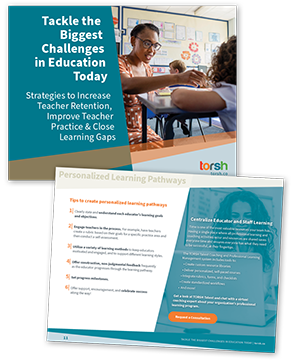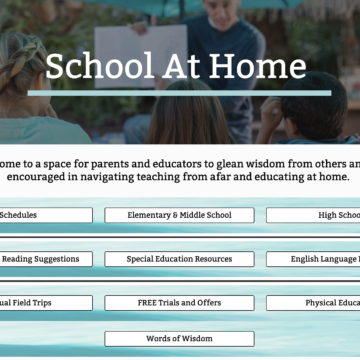Table of Contents
- The Power of Coaching-Based Professional Development for Teachers and Practitioners
- Coaching: An Ongoing, Iterative, and Personalized Process
- 6 Key Benefits of Coaching-Based Professional Development
- Educator Professional Development: In-Person vs. Online Coaching
- Why Should You Consider a Video-Based Coaching Platform?
- How an Online Professional Development Platform Benefits Diverse Stakeholders
- The Impact of a Comprehensive Coach-Based Teacher Professional Development Platform
The Power of Coaching-Based Professional Development for Teachers
Coaching is a type of professional development in education that offers an ongoing, personalized approach to support and guide educators in their professional growth. In this PD model, the coach works closely with the educator over an extended period of time, providing targeted feedback, modeling effective instructional strategies, collaborating on lesson planning, and encouraging the educator to reflect deeply on their practices and goals.
The individualized approach to teacher professional development offered by coaching is one that supports the educator throughout their career, allowing them to:
- continually build and hone new skills
- stay up-to-date with the latest teaching strategies and techniques
- become more confident and willing to take risks
- problem solve more effectively
In this article, we will explore the concept of coaching-based professional development for teachers and practitioners in greater detail, including its benefits and challenges, and some best practices for implementing this approach in school districts and organizations.
Coaching: An Ongoing, Iterative, and Personalized Process
Professional development is not something that magically ends when an educator reaches a certain “pinnacle” in their career. By its very nature, it is meant to be an ongoing, iterative process.
Education is a complex profession, and “even experienced teachers confront great challenges each year, including changes in subject content, new instructional methods, advances in technology, changed laws and procedures, and student learning needs,” reports Hayes Mizell in Why Professional Development Matters. “Educators who do not experience effective professional development do not improve their skills, and student learning suffers.”
Because it is designed to be cumulative and tailor-made to the individual educator, coaching is a form of PD that not only helps educators reach their full potential in the educational setting, but also leads to greater personal fulfillment, engagement, and motivation. A quality coaching-based PD program can help to promote job satisfaction and reduce burnout, making education a more attractive and sustainable career option.
Research demonstrates that coaching works. “Effective teacher professional development coaching can lead to significant improvements in teaching practices and student outcomes,” writes Jim Knight, PhD, in High-impact instruction: A framework for great teaching. “Specifically, research has shown that coaching that is ongoing, job-embedded, and focused on content and pedagogical knowledge can result in improvements in teacher knowledge, skills, and attitudes, as well as in student learning outcomes such as increased student engagement, higher academic achievement, and reduced achievement gaps.”
6 Key Benefits of Coaching-Based Professional Development
Incorporating coaching into your professional development toolkit has many benefits, including:
- Personalized support: Coaching provides individualized support for each educator’s unique needs and challenges. The coach can work with the teacher or practitioner to identify specific areas of improvement and develop a plan to address them.
- Improved instruction: Educators can learn new teaching strategies and techniques and receive feedback on their implementation as they continue on a path of career-long learning.
- Increased confidence: By receiving ongoing support and feedback, teachers and practitioners can increase their confidence in their abilities and feel more comfortable trying new instructional approaches.
- Growth mindset: Educators can develop a “can-do” attitude and a growth mindset, which helps them to see challenges (and even failure) as opportunities and room for growth. Writes Professor Carol Dweck in the Harvard Business Review, “Individuals who believe their talents can be developed (through hard work, good strategies, and input from others) have a growth mindset. They tend to achieve more than those with a more fixed mindset (those who believe their talents are innate gifts).”
- Collaborative learning: Coaching-based professional development can also promote collaboration and sharing among teachers and practitioners. Educators can learn from one another’s experiences and share their own insights and successes. Coaches themselves can also collaborate with peers to improve their own coaching practices.
- Improved Student Learning: Educators who receive mentorship and guidance in the form of coaching are equipped to better handle the needs of their diverse students, including those who are struggling.
Create a brighter future for all students and educators using the research-based strategies, tips, and tools shared in this playbook.
Educator Professional Development: In-Person vs. Online Coaching
If your organization is already sold on the coaching model or is considering incorporating it into your PD mix, you may want to weigh the pros and cons of in-person versus online coaching; a blended model is also an option. Here are some details to consider.
In-Person Coaching: Classroom Observation and Feedback
In-person classroom observation and feedback can be an effective method of educator and teacher professional development when it is implemented in a supportive and collaborative manner. It involves a coach or mentor observing a teacher or practitioner’s instruction and providing feedback on their practice. This feedback is typically focused on identifying areas for improvement, and can also be followed up with more in-depth discussions and goal-setting sessions between the educator and coach.
Potential Downfalls of In-Person Classroom Coaching
While in-person classroom coaching can be an effective form of professional development for teachers and other educators, there are also some potential hurdles to consider:
- Time and scheduling constraints: In-person coaching can be challenging to schedule around busy teaching schedules, and can take time away from classroom instruction.
- Limited reach: In-person coaching is typically limited to a specific geographic area or school district, which can limit access for educators who are not located in the area. Also, educators don’t get access to the widest possible pool of experts.
- Cost: In-person coaching can be expensive, particularly if it requires travel or accommodations for the coach.
- Interruptions to classroom instruction: The presence of a coach in the classroom can be disruptive to classroom instruction and may distract students.
- Personality conflicts: In-person coaching requires a close working relationship between the coach and educator, which can be challenging if there are personality conflicts or other issues that arise.
- Lack of anonymity: In-person coaching can make it difficult for educators to feel comfortable being vulnerable and sharing their struggles in a public setting.
Video-Based Online Coaching
Video coaching via an online professional development platform addresses many of the downfalls inherent in in-person coaching.
Video coaching also aligns well with the principles of “andragogy,” a term used by educator and author Malcolm Knowles to describe the art and science of adult learning. As opposed to pedagogy, the andragogy learning approach is built around what works best for mature learners. Knowles writes that “instruction for adults needs to focus more on the process and less on the content being taught.” The principles of andragogy suggest that adult learning is ideally self-directed, comes from internal motivation, and is primarily problem-centered and task-based. Adults learn best when the knowledge gleaned can be put into action and deliver immediate returns.
Video coaching provides an ideal professional development platform that supports this philosophy. The educator can share their problems and needs with a coach on their own terms and on their own time, rather than follow a strict regimen dictated by a one-size-fits-all course. The role of the coach is one of enabler, facilitator, and collaborator—all in an empathic and respectful relationship. The educator can immediately put their learnings to good use within their classroom or organization.
Why Should You Consider a Video-Based Coaching Platform?
Using a video-based platform for educator and teacher professional development can have numerous benefits, among them:
- Flexibility: Educators can access video-based professional development from anywhere, at any time, which can make it easier to fit into their busy schedules.
- Self-paced learning: Video-based professional development allows educators to learn at their own pace and pause, rewind, fast forward, or re-watch sections as needed. Coaches can also do the same while reviewing videos uploaded by the teacher or practitioner, as well as add time-stamped feedback.
- Personalized learning: Video-based coaching can be tailored to the individual needs of each educator, allowing them to focus on specific areas where they need improvement.
- Variety of topics: Video coaching can cover a wide range of topics and can provide access to experts in various fields, no matter their geographic location.
- Cost-effective: Video-based coaching is more cost-effective than in-person coaching, as it eliminates travel and accommodation costs. An independent two-year study by Child360 showed a 22 percent reduction in total costs.
- Increased engagement: Videos in general can be more engaging and interactive than other forms of professional development, as they can include visuals, animations, and interactive elements. Video coaching emphasizes and enables collaboration between coaches and educators, boosting engagement by making learning personal and authentic.
- Wider reach: According to a 2018 Harvard University report, “Leveraging video-based technology can increase the number of teachers with whom an individual coach can work and provide access to high quality coaches for schools or districts without local expertise.”
A Hybrid Blended Model: Video Plus In-Person Coaching
For some organizations and districts, a blend of in-person coaching and video coaching can offer the best of both worlds. Every educator is unique; some may respond more positively to the presence of an actual “3D” human being in their classroom, while some may be more comfortable interacting with their coach through a screen.
By offering a blended option, you widen your support systems for educators, offering more opportunities for engagement. In-person coaching can bolster the skills a teacher or practitioner is working on with their video coach, and vice versa. Regardless of how coaching is delivered, the relationship between coach and educator should be one of trust and collaboration, which contributes to personal growth and a healthy, collegial organizational culture.
How an Online Professional Development Platform Benefits Diverse Stakeholders
Education professionals in a variety of settings and in all roles—from administrators to classroom teachers to early intervention providers—can all benefit from an online PD platform. Such a platform allows for more quality time to engage in deep, reflective work to develop new strategies and build instructional practices that will ultimately improve outcomes for all.
K-12: Online professional learning technology allows you to support every educator, from new to veteran, with individualized guidance and feedback. Here’s one example of what a coaching-rich district looks like in a K-12 public school: Video Coaching: Lessons Learned from a Coaching-Rich District
Higher Education: An online PD platform can provide a seamless and enriching experience for faculty and students, allowing you to support research, teacher residency, and a wide range of degree programs.
Early Education: Online PD can help early education providers to hone their skills and align their goals with best practices while giving leaders the ability to collect and store data, create a resource library, and reduce travel.
Early Intervention: Online PD can help early intervention staff to elevate their professional learning with evidence-based theories of practice in a convenient and secure manner. Here is more information on how early intervention providers can benefit from a professional development platform: Early Intervention Training Questions Answered.
The Impact of a Comprehensive Coach-Based Educator Professional Development Platform
An effective PD and coaching program can support educator retention and improve student outcomes by providing ongoing support and feedback, enhancing teaching skills and knowledge, fostering collaboration and community, and addressing individual educator needs. TORSH Talent facilitates collaboration between coaches and educators through secure video sharing, time-stamped feedback, in-platform live video conferencing, and an online resource library of exemplars. Take a look at how early education, early intervention, and K–12 organizations across the country are providing more coaching, more efficiently and effectively, using TORSH Talent.






